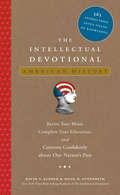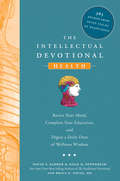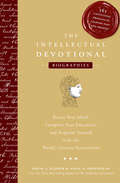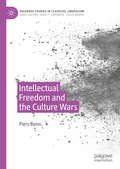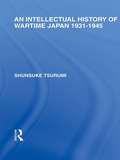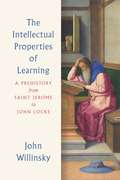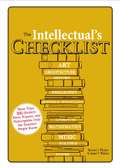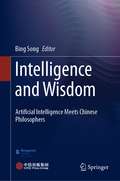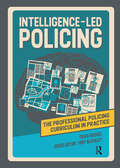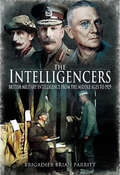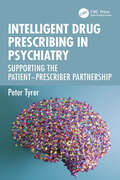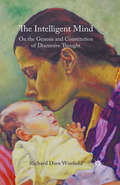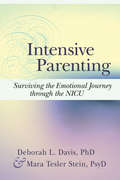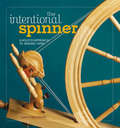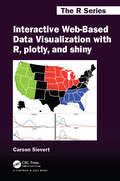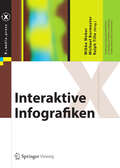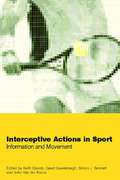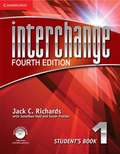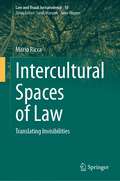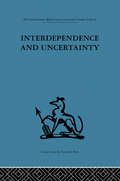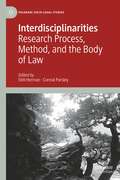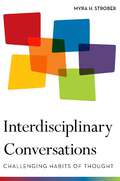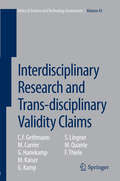- Table View
- List View
The Intellectual Devotional: Revive Your Mind, Complete Your Education, and Converse Confidently about Our Na tion's Past (The Intellectual Devotional Series)
by David S. Kidder Noah D. OppenheimModeled after those bedside books of prayer and contemplation that millions turn to for daily spiritual guidance and growth, the national bestseller The Intellectual Devotional—offering secular wisdom and cerebral nourishment—drew a year's worth of readings from seven different fields of knowledge. <P><P>In The Intellectual Devotional: American History, authors David S. Kidder and Noah D. Oppenheim have turned to the rich legacy of American history for their selections. <P>From Thomas Jefferson and Benjamin Franklin to Martin Luther King Jr., from the Federalist Papers to Watergate, the giant figures, cultural touchstones, and pivotal events in our national heritage provide a bountiful source of reflection and education that will refresh knowledge, revitalize the mind, and open new horizons of intellectual discovery.
The Intellectual Devotional: Revive Your Mind, Complete Your Education, and Digest a Daily Dose of Wellness W isdom (The Intellectual Devotional Series)
by David S. Kidder Noah D. OppenheimIn this fourth installment of the New York Times bestselling Intellectual Devotional series, authors Noah Oppenheim and David Kidder have partnered with Bruce K. Young, MD, to offer a year's worth of medical knowledge and wellness wisdom. <P><P>Each daily dose in this infectious volume offers insight into the mysterious terrain of the human body and the factors that impact its constitution. Drawn from seven diverse categories, including lifestyle and preventive medicine; the mind; medical milestones; drugs and alternative treatments; sexuality and reproduction; diseases and ailments; and children and adolescents, these 365 entries are as informative as they are functional. <P>From aspirin to the x-ray, headaches to Hippocrates, Viagra to influenza, The Intellectual Devotional: Health will revive the mind and rejuvenate the body. <P>Sure to please devoted intellectuals and newcomers alike, this timely volume sheds new light on an endlessly fascinating subject: ourselves.
The Intellectual Devotional: Revive Your Mind, Complete Your Education, and Acquaint Yourself with the World' s Greatest Personalities (The Intellectual Devotional Series)
by Noah D. Oppenheim David S. KidderThe fifth installment of this bestselling series features 365 captivating entries about the most celebrated personalities in history. <P><P>Like its compulsively readable predecessors, The Intellectual Devotional: Biographies is organized into seven categories, one for each day of the week. With their trademark wit and style, authors David Kidder and Noah Oppenheim offer an array of fascinating facts about major figures from Atilla the Hun to Desmond Tutu. <P>In this daily devotional, learn about: <br>• authors and artists, from Homer and Ovid to Oscar Wilde and Virginia Woolf• leaders, such as Queen Elizabeth I, Abraham Lincoln, Susan B. Anthony, and Napoleon Bonaparte <br>• innovators, from Johannes Gutenberg to Isaac Newton to Werner Heisenberg• philosophers, including Socrates, Epicurus, Friedrich Nietzsche, and Jean-Paul Sartre <br>• rebels and reformers, from Joan of Arc and Spartacus to Galileo and Che Guevara <br>• preachers and prophets, including Lao-tzu, John the Baptist, Martin Luther, and Gandhi <br>• villains, such as Benedict Arnold, Genghis Khan, Ivan the Terrible, and Jack the Ripper <P>This volume shares the personal histories, accomplishments,and troubles of 365 people who have left an indelible mark on the world.
Intellectual Freedom and the Culture Wars (Palgrave Studies in Classical Liberalism)
by Piers BennThis book offers a sustained and vigorous defence of free expression and objective enquiry situated in the context of the current culture wars. In the spirit of J. S. Mill, Benn investigates objections to the ideal of free expression in relation to harm and offence, reaching broadly liberal conclusions with reference to recent examples of attempts to curb free speech on university campuses. Accepting that some expressions can cause non-physical harm, Benn also considers objections to free speech based on certain understandings of power and privilege. In its exploration and rejection of arguments against the possibility of obtaining objective truth, the book navigates hotly contested fields of contemporary debate, including feminism and identity politics. It challenges the dogma of social constructionism and examines current notions of identity, arguing that a case for fairness can be made without appealing to them. Offering a qualified endorsement of friendship between ideological opponents, Benn highlights common obstacles to civil and rational discussions, concluding with a rational, moral, and broadly spiritual solution to the cultural combat that monopolises present-day society.
An Intellectual History of Wartime Japan: 1931-1945 (Routledge Library Editions: Japan)
by Shunsuke TsurumiWhen this book was published in Japanese in 1982 it was awarded the prestigious Jiro Osaragi Prize. It is an important contribution to the understanding of the mental and spiritual world of Japan just over two generations ago. The author argues that just as the period of isolation up to the middle of the 19th century was crucial for Japan’s development, so the Second World War represented another crucial period for the country. These years were a period of intellectual isolation during which significant development took place.
The Intellectual Properties of Learning: A Prehistory from Saint Jerome to John Locke
by John WillinskyProviding a sweeping millennium-plus history of the learned book in the West, John Willinsky puts current debates over intellectual property into context, asking what it is about learning that helped to create the concept even as it gave the products of knowledge a different legal and economic standing than other sorts of property. Willinsky begins with Saint Jerome in the fifth century, then traces the evolution of reading, writing, and editing practices in monasteries, schools, universities, and among independent scholars through the medieval period and into the Renaissance. He delves into the influx of Islamic learning and the rediscovery of classical texts, the dissolution of the monasteries, and the founding of the Bodleian Library before finally arriving at John Locke, whose influential lobbying helped bring about the first copyright law, the Statute of Anne of 1710. Willinsky’s bravura tour through this history shows that learning gave rise to our idea of intellectual property while remaining distinct from, if not wholly uncompromised by, the commercial economy that this concept inspired, making it clear that today’s push for marketable intellectual property threatens the very nature of the quest for learning on which it rests.
The Intellectual's Checklist
by James V. Wallace Richard J. WallaceCan you name: All five movements of Beethoven's Missa solemnis. Check. The films that Kurosawa based on Western works. Check. Dante's Nine Circles of Hell. Check. If so, you're off to an edifying start--but that's just round one in this hard-hitting match of wits and wisdom. Take the formidable plunge--and find out if you are truly well versed enough to call yourself an aspiring pundit, poet, and philosopher. Either way, you'll be worthy of the esteemed moniker intellectual by the time you've gone the distance with this book. (As Thoreau is our witness.) Whether you are just beginning to suspect you're the possessor of superior acumen or you'd bet your Homeric Greek translation of The Iliad on it, this book is an essential addition to any personal library.
The Intellectual's Checklist
by Richard J WallaceCan you name:All five movements of Beethoven's Missa solemnis. Check.The films that Kurosawa based on Western works. Check.Dante's Nine Circles of Hell. Check.If so, you're off to an edifying start--but that's just round one in this hard-hitting match of wits and wisdom. Take the formidable plunge--and find out if you are truly well versed enough to call yourself an aspiring pundit, poet, and philosopher. Either way, you'll be worthy of the esteemed moniker intellectual by the time you've gone the distance with this book. (As Thoreau is our witness.)Whether you are just beginning to suspect you're the possessor of superior acumen or you'd bet your Homeric Greek translation of The Iliad on it, this book is an essential addition to any personal library.
The Intellectual's Checklist
by Richard J. Wallace James V. WallaceAll five movements of "Beethoven's Missa" solemnis. Check. The films that Kurasawa based on Western works. Check. Dante's "Nine Circles of Hell". Check. These are the sorts of elegant erudition every self-respecting intellectual should know - inside and out. In "The Intellectual's Checklist", aspiring pundits, poets, and philosophers find the arcane checklists that reveal whether they are truly well-versed enough in the arts and sciences of the obscure to warrant the esteemed moniker "Intellectual". From Nietzsche to Newton, Einstein to Eisenstadt, Sappho to Sartre, this elucidating volume gives readers all the esoterica they need to bask in the knowledge that they really do know everything. (Now that they've read this book. )
Intelligence and Wisdom: Artificial Intelligence Meets Chinese Philosophers
by Bing SongThis book centers on rethinking foundational values in the era of frontier technologies by tapping into the wisdom of Chinese philosophical traditions. It tries to answer the following questions: How is the essence underpinning humans, nature, and machines changing in this age of frontier technologies? What is the appropriate ethical framework for regulating human–machine relationships? What human values should be embedded in or learnt by AI? Some interesting points emerged from the discussions. For example, the three dominant schools of Chinese thinking–Confucianism, Daoism and Buddhism– invariably reflect non-anthropocentric perspectives and none of them places humanity in a supreme position in the universe. While many Chinese philosophers are not convinced by the prospect of machine intelligence exceeding that of humans, the strong influence of non-anthropocentrism in the Chinese thinking contributed to much less panic in China than in the West about the existential risks of AI. The thinking is that as human beings have always lived with other forms of existence, living with programs or other forms of “beings,” which may become more capable than humans, will not inevitably lead to a dystopia. Second, all three schools emphasize self-restraint, constant introspection, and the pursuit of sage-hood or enlightenment. These views therefore see the potential risks posed by frontier technologies as an opportunity for the humanity to engage in introspection on the lessons learned from our social and political history. It is long overdue that humanity shall rethink its foundational values to take into account a multi-being planetary outlook. This book consists of nine leading Chinese philosophers’ reflections on AI’s impact on human nature and the human society. This is a groundbreaking work, which has pioneered the in-depth intellectual exploration involving traditional Chinese philosophy and frontier technologies and has inspired multidisciplinary and across area studies on AI, philosophy, and ethical implications.
Intelligence-led Policing (The Professional Policing Curriculum in Practice)
by Craig HughesIntelligence-led Policing clearly explains the distinction between information and intelligence, and discusses how to gather, analyse and utilise intelligence to inform decision making in practice. It relates all areas of intelligence within the investigative process and contextualises its use in line with the National Intelligence Model (NIM) as part of routine working practice. It develops a knowledge base by identifying six tiers of policing intelligence architecture, exploring the concept of intelligence as it applies to strategic, tactical and practice levels of operational policing. A great mix of theory and practice to help students explore how information can become useful intelligence including the process through which it goes and the importance of intervention points.The Professional Policing Curriculum in Practice is a new series of books that match the requirements of the new pre-join policing qualifications. The texts reflect modern policing, are up-to-date and relevant, and grounded in practice. They reflect the challenges faced by new students, linking theory to real-life operational practice, while addressing critical thinking and other academic skills needed for degree-level study.
The Intelligencers: British Military Intelligence From the Middle Ages to 1929
by Brian ParrittIntelligence about the enemy is a fundamental part of any war or battle; knowledge of the enemys strength, dispositions and intentions are essential for success. This book reveals that for 250 years the British Army resolutely failed to prepare for war by refusing to establish a nucleus of soldiers in peace, trained to obtain intelligence in war. Although there were Scoutmasters and secret spy organizations such as Walsinghams in the 15th Century, in no major conflict from the Civil War of 1642, including the Peninsula, the Crimea, Burma, Egypt and South Africa and in the multitude of small wars that gained Britain an empire, was there any staff branch or unit specifically pre-established to gain intelligence or frustrate the enemy from obtaining intelligence. Yet the story of British military endeavor over 250 years is a remarkable story of individuals bravery, achievement and success. We read of the Scoutmaster whose role was to gather intelligence on the Kings enemies and of Walsinghams secret organization at the time of Elizabeth I. During the long years of war against France culminating in the Napoleonic Wars, spy masters developed on an ad hoc basis. In the Nineteenth Century, despite the power and reach of Empire, no central intelligence organization existed. Enterprising young officers worked wonders but failures such as those in the Boer War cost the Nation dearly. It took the reverses in the Great War to create an Intelligence Corps. But even that was disbanded postwar.
Intelligent Drug Prescribing in Psychiatry: Supporting the Patient-Prescriber Partnership
by Peter TyrerThis new book, drawing on the author’s distinguished career in front-line psychiatric practice, describes how to bring patient and prescriber together in an active partnership whereby there is better understanding of the positive and negative elements of drug prescription. At present there is a gap between expectations, with doctors not always able to admit their ignorance of some aspects of drug action, and patients kept unaware of these uncertainties. Balanced decision-making with joint involvement is needed to separate those drugs that are needed regularly to maintain health, those that are only needed when required and those that are mere fashion accessories. Greater care is needed over the explanation of the first prescription, the expected duration of treatment and the plans for eventual withdrawal. The consequence of a better partnership will be less over-prescribing, a reduction of polypharmacy and a lessened need for deprescribing, the planned systematic reduction of drug treatment that has got completely out of control.Concentrating on routine prescribing for psychiatric and mental health disorders rather than unusual conditions and illustrated with real-life anecdotes and case histories, this is essential reading for trainee and practising psychiatrics, general practitioners and pharmacists.
The Intelligent Mind: On the Genesis and Constitution of Discursive Thought
by Richard Dien WinfieldThe Intelligent Mind conceives the psychological reality of thought and language, explaining how intelligence develops from intuition to representation and then to linguistic interaction and thinking. Overcoming the prevailing dogmas regarding how discursive reason emerges, this book secures the psychological possibility of the philosophy of mind.
Intensive Parenting
by Ph.D. Deborah L. Davis Mara Tesler SteinParenthood transforms you. Even before this crisis, you may have experienced a wide range of feelings triggered by pregnancy, birth, and welcoming a new baby. The NICU experience challenges your emotional coping, your developing parental identity, your relationship skills, and your ability to adjust. Intensive Parenting explores the emotions of parenting in the neonatal intensive care unit, from in-hospital through issues and concerns after the child is home. Deboral L. Davis and Mara Tesler Stein describe and affirm the wide range of experiences and emotional reactions that occur in the NICU and offer strategies for parents coping with their baby's condition and hospitalization. Deborah L. Davis, PhD, is a developmental psychologist and writer who is the author of several books that support grieving parents including Empty Cradle, Broken Heart: Surviving the Death of Your Baby and Loving and Letting Go. Mara Tesler Stein, PsyD, is a clinical psychologist. She consults to healthcare providers and hospitals, guiding their efforts to improve the level of psychological support and care to families in Labor and Delivery and in the NICU. She specializes in the emotional aspects of coping with crisis around pregnancy and parenting.
The Intentional Spinner: A Holistic Approach To Making Yarn
by Judith MackenzieOffering a blend of technical knowledge, history, and easy-to-use tips, this inspiring collection of spinning wisdom deftly explores the three fundamental areas of yarn production: understanding fibers, managing yarn structure, and making yarns that precisely meet the spinner's needs. The rich, historic traditions of plant and animal fibers are fascinatingly juxtaposed with recent advances in synthesized fiber and mankind's use of fibers in the past, present, and future, while detailed, image-laden instructions for four intermediate projects demonstrate the range of possibilities, from sturdy, plied yarns to playful, novelty yarns. Spinners are also offered guidance on planning a project from start to finish, as well as how to care for and store completed projects.
Interactive Web-Based Data Visualization with R, plotly, and shiny (Chapman & Hall/CRC The R Series)
by Carson SievertThe richly illustrated Interactive Web-Based Data Visualization with R, plotly, and shiny focuses on the process of programming interactive web graphics for multidimensional data analysis. It is written for the data analyst who wants to leverage the capabilities of interactive web graphics without having to learn web programming. Through many R code examples, you will learn how to tap the extensive functionality of these tools to enhance the presentation and exploration of data. By mastering these concepts and tools, you will impress your colleagues with your ability to quickly generate more informative, engaging, and reproducible interactive graphics using free and open source software that you can share over email, export to pdf, and more. Key Features: Convert static ggplot2 graphics to an interactive web-based form Link, animate, and arrange multiple plots in standalone HTML from R Embed, modify, and respond to plotly graphics in a shiny app Learn best practices for visualizing continuous, discrete, and multivariate data Learn numerous ways to visualize geo-spatial data This book makes heavy use of plotly for graphical rendering, but you will also learn about other R packages that support different phases of a data science workflow, such as tidyr, dplyr, and tidyverse. Along the way, you will gain insight into best practices for visualization of high-dimensional data, statistical graphics, and graphical perception. The printed book is complemented by an interactive website where readers can view movies demonstrating the examples and interact with graphics.
Interaktive Infografiken
by Michael Burmester Ralph Tille Wibke WeberIn einer Welt der Multimedialität gewinnt ein Visualisierungstyp zunehmend an Bedeutung: die interaktive Infografik. Sie wird im Journalismus ebenso eingesetzt wie in der Unternehmenskommunikation. Dieses Buch führt auf Grundlage aktueller Forschungserkenntnisse in Theorie, Design und Rezeption von interaktiven Infografiken ein: Wie werden sie wahrgenommen? Welche Vorteile bieten sie für das Verstehen und Behalten von Inhalten? Gibt es Gestaltungs- und Erzählmuster? Welche Methoden wenden Infografiker an? Mit Beispielen und Tipps von Experten.
Interceptive Actions in Sport: Information and Movement
by Keith Davids Geert Savelsbergh Simon J. Bennett John Van der KampDynamic interceptive actions are those actions for which the body, or an implement, must be moved into the right place at the right time in order to accomplish a task. These actions are particularly prevalent in sport, for example reaching to catch a ball or running towards a target to make a tackle. This book is the first to offer a comprehensive review of existing theoretical research on dynamic interceptive actions, as well as close examination of specific, practical applications. The book includes material on: * catching * wielding tennis rackets * putting in golf * controlling and kicking a soccer ball. It is essential reading for anybody with a close interest in motor learning and control or skill acquisition, and will be of interest to students of sport psychology, movement science and coaching science.
Interchange Level 1 Student's Book (Fourth Edition)
by Jack C. Richards Jonathan Hull Susan Proctor David BohlkeInterchange offers a complete set of tools for learning how to communicate in English. Interchange Fourth Edition is a four-level series for adult and young-adult learners of English from the beginning to the high-intermediate level. Interchange Fourth Edition is a four-level series for adult and young-adult learners of English from the beginning to the high-intermediate level. Student's Book, Level 1 builds on the foundations established in the Intro level for accurate and fluent communication, extending grammatical, lexical, and functional skills. The Student's Book contains 16 teaching units, progress checks, additional Interchange activities, and a Grammar Plus section that provides additional grammar explanations and practice.
Intercultural Spaces of Law: Translating Invisibilities (Law and Visual Jurisprudence #10)
by Mario RiccaThis book proposes an interdisciplinary methodology for developing an intercultural use of law so as to include cultural differences and their protection within legal discourse; this is based on an analysis of the sensory grammar tacitly included in categorizations. This is achieved by combining the theoretical insights provided by legal theory, anthropology and semiotics with a reading of human rights as translational interfaces among the different cultural spaces in which people live. To support this use of human rights’ semantic and normative potential, a specific cultural-geographic view dubbed ‘legal chorology’ is employed. Its primary purpose is to show the extant continuity between categories and spaces of experience, and more specifically between legal meanings and the spatial dimensions of people’s lives. Through the lens of legal chorology and the intercultural, translational use of human rights, the book provides a methodology that shows how to make space and law reciprocally transformative so as to create an inclusive legal grammar that is equidistant from social cultural differences. The analysis includes: a critical view on opportunities for intercultural secularization; the possibility of construing a legal grammar of quotidian life that leads to an inclusive equidistance from differences rather than an unachievable neutrality or an all-encompassing universal legal ontology; an interdisciplinary methodology for legal intercultural translation; a chorological reading of the relationships between human rights protection and lived spaces; and an intercultural and geo-semiotic examination of a series of legal cases and current issues such as indigenous peoples’ rights and the international protection of sacred places.
Interdependence and Uncertainty: A study of the building industry
by Charles CrichtonTavistock Press was established as a co-operative venture between the Tavistock Institute and Routledge & Kegan Paul (RKP) in the 1950s to produce a series of major contributions across the social sciences. This volume is part of a 2001 reissue of a selection of those important works which have since gone out of print, or are difficult to locate. Published by Routledge, 112 volumes in total are being brought together under the name The International Behavioural and Social Sciences Library: Classics from the Tavistock Press. Reproduced here in facsimile, this volume was originally published in 1966 and is available individually. The collection is also available in a number of themed mini-sets of between 5 and 13 volumes, or as a complete collection.
Interdisciplinarities: Research Process, Method, and the Body of Law (Palgrave Socio-Legal Studies)
by Didi Herman Connal ParsleyThis book illuminates methodology in legal research by bringing together interdisciplinary scholars, who employ a diverse set of methodologies, to address a specific shared research challenge: ‘the body’. The contributors were asked a question: if you were invited to contribute to an edited book on ‘the body’, where would you start and then where would you go? The result is a self-reflective discussion of how and where researchers engage with methodological practices. The contributors draw on their own interdisciplinary research experiences to explore how ‘the body’ might be addressed in their work, and the resources they would deploy in order to carry out the task. This ‘book within a book’ is innovative in both content and format. It provides a rare insight into how top interdisciplinary legal scholars go about making decisions about their research. The shared device of ‘the body’ allows the volume to trace a number of rich approaches into the process of research as practiced by these diverse scholars. In presenting thinking and research in action, the volume offers a new, self-reflective view on the much-addressed theme of the body, as well as taking a fresh approach to the historically vexed problem of research methodology in legal studies.
Interdisciplinary Conversations: Challenging Habits of Thought
by Myra H. StroberInterest in doing, funding, and studying interdisciplinary work has built to crescendo in recent years. But despite this growing enthusiasm, our collective understanding of the dynamics, rewards, and challenges of faculty conversations across disciplines remains murky. Through six case studies of interdisciplinary seminars for faculty, Interdisciplinary Conversations investigates pivotal interdisciplinary conversations and analyzes the factors that make them work. Past discussions about barriers to interdisciplinary collaborations fixate on funding, the academic reward system, and the difficulties of evaluating research from multiple fields. This book uncovers barriers that are hidden: disciplinary habits of mind, disciplinary cultures, and interpersonal dynamics. Once uncovered, these barriers can be broken down by faculty members and administrators. While clarion calls for interdisciplinarity rise in chorus, this book lays out a clear vision of how to realize the creative potential of interdisciplinary conversations.
Interdisciplinary Research and Trans-disciplinary Validity Claims
by C. F. Gethmann M. Carrier G. Hanekamp M. Kaiser G. Kamp S. Lingner M. Quante F. ThieleInterdisciplinarity has seemingly become a paradigm for modern and meaningful research. Clearly, the interdisciplinary modus of deliberation enables to unfold relevant but quite different disciplinary perspectives to the reflection of broader scientific questions or societal problems. However, whether the comprehensive results of interdisciplinary reflection prove to be valid or to be acceptable in trans-disciplinary terms depends upon certain preconditions, which have to be fulfilled for securing scientific quality and social trust in advisory contexts. The present book is written by experts and practitioners of interdisciplinary research and policy advice. It analyses topical and methodological approaches towards interdisciplinarity, starting with the current role of scientific research in society. The volume continues with contributions to the issues of knowledge and acting and to trans-disciplinary deliberation. The final conclusions address the scientific system as substantial actor itself as well as the relevant research and education politics.
